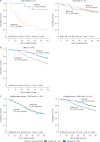CMS-dependent prognostic impact of KRAS and BRAFV600E mutations in primary colorectal cancer
- PMID: 29518181
- PMCID: PMC5961317
- DOI: 10.1093/annonc/mdy085
CMS-dependent prognostic impact of KRAS and BRAFV600E mutations in primary colorectal cancer
Abstract
Background: The prognostic impact of KRAS and BRAFV600E mutations in primary colorectal cancer (CRC) varies with microsatellite instability (MSI) status. The gene expression-based consensus molecular subtypes (CMSs) of CRC define molecularly and clinically distinct subgroups, and represent a novel stratification framework in biomarker analysis. We investigated the prognostic value of these mutations within the CMS groups.
Patients and methods: Totally 1197 primary tumors from a Norwegian series of CRC stage I-IV were analyzed for MSI and mutation status in hotspots in KRAS (codons 12, 13 and 61) and BRAF (codon 600). A subset was analyzed for gene expression and confident CMS classification was obtained for 317 samples. This cohort was expanded with clinical and molecular data, including CMS classification, from 514 patients in the publically available dataset GSE39582. Gene expression signatures associated with KRAS and BRAFV600E mutations were used to evaluate differential impact of mutations on gene expression among the CMS groups.
Results: BRAFV600E and KRAS mutations were both associated with inferior 5-year overall survival (OS) exclusively in MSS tumors (BRAFV600E mutation versus KRAS/BRAF wild-type: Hazard ratio (HR) 2.85, P < 0.001; KRAS mutation versus KRAS/BRAF wild-type: HR 1.30, P = 0.013). BRAFV600E-mutated MSS tumors were strongly enriched and associated with metastatic disease in CMS1, leading to negative prognostic impact in this subtype (OS: BRAFV600E mutation versus wild-type: HR 7.73, P = 0.001). In contrast, the poor prognosis of KRAS mutations was limited to MSS tumors with CMS2/CMS3 epithelial-like gene expression profiles (OS: KRAS mutation versus wild-type: HR 1.51, P = 0.011). The subtype-specific prognostic associations were substantiated by differential effects of BRAFV600E and KRAS mutations on gene expression signatures according to the MSI status and CMS group.
Conclusions: BRAFV600E mutations are enriched and associated with metastatic disease in CMS1 MSS tumors, leading to poor prognosis in this subtype. KRAS mutations are associated with adverse outcome in epithelial (CMS2/CMS3) MSS tumors.
Figures


References
-
- Moertel CG, Fleming TR, Macdonald JS. et al. Fluorouracil plus levamisole as effective adjuvant therapy after resection of stage III colon carcinoma: a final report. Ann Intern Med 1995; 122(5): 321–326. - PubMed
-
- Sepulveda AR, Hamilton SR, Allegra CJ. et al. Molecular biomarkers for the evaluation of colorectal cancer: guideline from the American Society for Clinical Pathology, College of American Pathologists, Association for Molecular Pathology, and American Society of Clinical Oncology. J Mol Diagn 2017; 19(2): 187–225. - PMC - PubMed
-
- Guastadisegni C, Colafranceschi M, Ottini L, Dogliotti E.. Microsatellite instability as a marker of prognosis and response to therapy: a meta-analysis of colorectal cancer survival data. Eur J Cancer 2010; 46(15): 2788–2798. - PubMed
-
- Samowitz WS, Sweeney C, Herrick J. et al. Poor survival associated with the BRAF V600E mutation in microsatellite-stable colon cancers. Cancer Res 2005; 65(14): 6063–6069. - PubMed
Publication types
MeSH terms
Substances
LinkOut - more resources
Full Text Sources
Other Literature Sources
Medical
Research Materials
Miscellaneous

